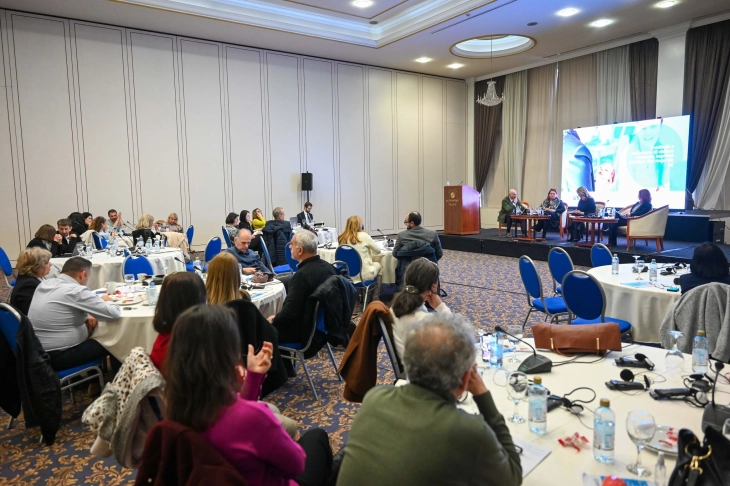UNICEF in North Macedonia: Improving vaccine coverage requires reorganization of preventive health care for children
- Post By Angel Dimoski
- 18:11, 25 January, 2024

Skopje, 25 January 2024
Today at an event to discuss the findings and preliminary policy recommendations of the functional and financial analysis of the vaccination services, as well as a study on needed investment in home visiting services, policy makers, health experts and partners concluded that there is need to continue to work to strengthening preventive health care services for children.
All stakeholders agreed that routine immunization services and home visiting services need increased investment and more efficient use of resources to be able to restore routine vaccine coverage to levels of 90-95% across the country.
“Preventive healthcare is one of the main pillars of the healthcare system. I am glad that today we have an excellent opportunity for the exchange of knowledge and experience with the aim of improving the patronage service, immunization and the preventive health care system,“ said Fatmir Mexhiti, Minister of Health.
During the event, policy makers, healthcare practitioners and experts discussed the challenges and opportunities to improve immunization service delivery and reach most vulnerable communities. The discussion built on the findings and recommendations from a functional and financial analysis of the vaccination services, which identified gaps and challenges in the current system in terms of its organizational setup, resource allocation and workforce capacity.
“I hope these recommendations will be included in the National Immunization Strategy. The U.S. government remains committed to supporting North Macedonia in its efforts to build strong, resilient, and accountable institutions. Our collective commitment is vital for protecting those most vulnerable,” said Jeri Dible, Country Representative, USAID North Macedonia.
“The pandemic put enormous strain on the health care system and disrupted routine immunization services. While there has been some recovery, there is a need for increased investment to address the system gaps that were unveiled during efforts to build a more resilient health system. It is no longer enough to procure and distribute quality vaccines. The country needs to rethink and reorganize the capacities it needs to deliver integrated preventive care programmes so that the services respond to massive demographic changes and increase in vaccine hesitancy, while leveraging new opportunities such as digitalization,” said Patrizia DiGiovanni, UNICEF Representative. “Every child deserves the best possible start in life, and preventive health care is a critical component of achieving this goal.”
Among the issues discussed were the unequal distribution of vaccination teams when compared to the size of the population they serve, staff shortages and lack of coordination and collaboration with patronage nurses, family doctors and pediatricians. These, among other things such as lack of equipment, prevent immunization teams from delivering the same level of services and community outreach in communities, but also prevent immunization teams to keep digital records up to date. Staff shortages within the primary and preventive protection sector within the Ministry of Health and other capacity challenges were also discussed.
Furthermore, the dialogue zoomed in on home visiting services, to identify an investment case for supporting the development and sustainability of the service, with a particular focus on developing linkages and coordination with the immunization services. Patronage nurses are an important entry point for vaccine uptake, addressing misinformation about vaccines and concerns that families have, reminding families with children on the vaccination calendar and making sure they have the necessary information on how to get the vaccines. Yet, currently there is no system in place to coordinate and integrate immunization support and more work is needed to strengthen the home visiting service in rural, Roma and Albanian communities. Additionally, there is a need to increase the annual budget allocations for the home visiting to ensure good quality service, as well as to introduce career development incentives to retain existing workforce and attract new professionals.
The event concluded that the key recommendations should be reflected in a National Immunization Strategy that is being developed and other relevant Government policy documents. The key recommendations include: improving the geographic distribution of vaccination teams to better cover the child population; introducing incentives for immunization teams to reach recommended vaccine coverage and maintain up-to-date digital database on vaccinations to ensure agile planning of outreach activities; further strengthening immunization planning and monitoring; and develop and implement a national programme for community outreach and public education.
This initiative is part of a wider UNICEF effort supported by USAID. The project “Preventing and Responding to COVID-19 in North Macedonia” aims to better equip the national health system for effective response to COVID-19, to strengthen it and enhance its resilience for any upcoming pandemic or outbreak when it comes to routine immunization.
UNICEF
______________________________________________________________________________________________________________________
MIA publishes these pieces in their original form and is not responsible for their content, wording, or spelling.
Photo: UNICEF







